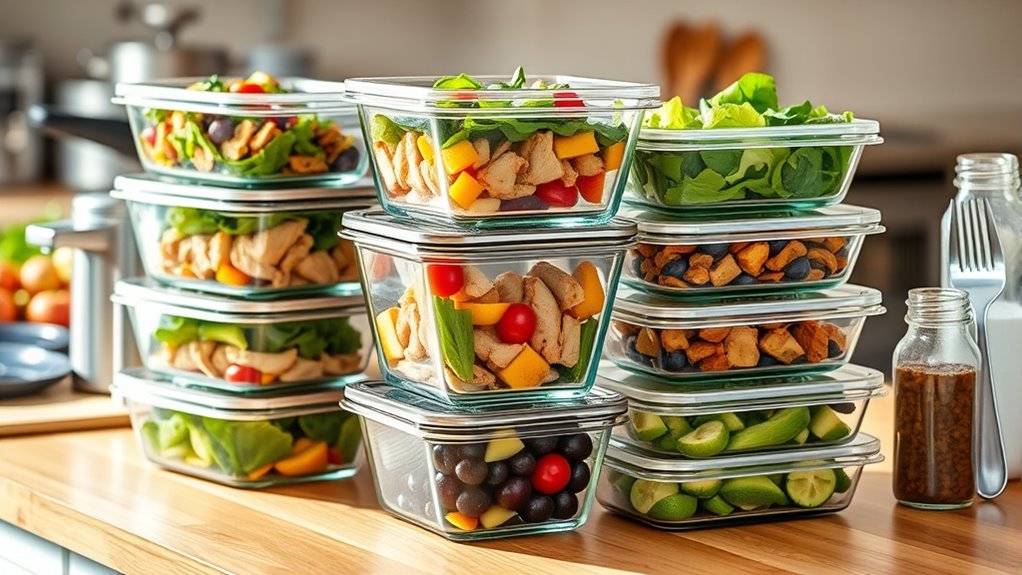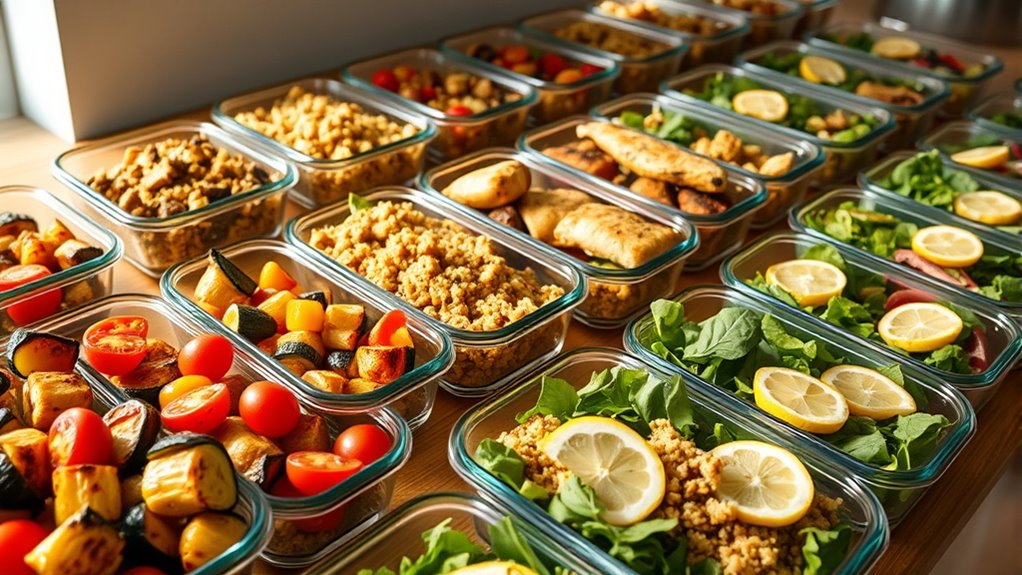When prepping for multi-day events, focus on nutrient-dense, easy-to-transport meals that require minimal cooking. Pack portioned items like salads, wraps, and snack packs, using airtight containers to keep everything fresh. Incorporate balanced foods with proteins, whole grains, healthy fats, and colorful produce for sustained energy. Keep perishable items cold with ice packs and stay hydrated with water bottles or electrolyte drinks. For more tips on efficient meal planning, keep exploring these helpful strategies.
Key Takeaways
- Choose easy-to-transport, no-cook or minimal-cook meals like salads, wraps, and snack packs for convenience.
- Incorporate nutrient-dense foods such as lean proteins, whole grains, healthy fats, and colorful produce for sustained energy.
- Use airtight containers, portion meals in advance, and label for simple grab-and-go access.
- Keep perishables cold with ice packs and pack plenty of water and electrolyte drinks to stay hydrated.
- Plan for balanced, simple meals that can be stored safely and require minimal last-minute preparation.

When you’re preparing for a multi-day event, planning your meals ahead of time can make a huge difference in staying energized and stress-free. You’ll want to focus on creating meals that are easy to transport, quick to reheat or eat cold, and packed with nutrients to keep your energy levels steady. Start by considering your schedule and the available facilities. If you won’t have access to a full kitchen, aim for no-cook or minimal-cook options like salads, wraps, or snack packs. If you do have access to a microwave or stove, you can include more versatile dishes that can be prepared in advance and heated when needed.
Plan easy, portable meals with minimal cooking for stress-free, energy-boosting multi-day events.
Next, think about the types of foods that will satisfy your hunger and sustain you through busy days. Include a balance of lean proteins, complex carbs, healthy fats, and plenty of fruits and vegetables. Protein options like grilled chicken, hard-boiled eggs, or beans hold up well over several days and help prevent fatigue. Whole grains such as brown rice, quinoa, or whole wheat bread provide sustained energy, while nuts, seeds, and avocado give you healthy fats that support brain function and overall stamina. Incorporate a variety of colorful produce to boost your immune system and keep your meals interesting.
Prepping in advance means portioning your meals into containers that are easy to grab and go. Use airtight containers to preserve freshness, and label them if you’re packing multiple days’ worth of food. Consider packing some snacks separately, like trail mix, granola bars, or cut-up veggies, to keep your energy up between main meals. Hydration is equally important, so include plenty of water and consider adding electrolyte drinks if you’ll be active or in hot environments. Reusable bottles are eco-friendly and convenient for refilling throughout the day.
When packing, think about storage and transportation. Keep perishable items cold with ice packs, especially if you’re traveling or don’t have refrigeration access. Avoid overly complicated meals that require last-minute assembly—simplicity is key to saving time and reducing stress. Make sure your meals are balanced and flavorful enough to keep you motivated to eat healthy during a busy schedule. Planning ahead means you won’t have to scramble for food options last minute, and you’ll have peace of mind knowing you’re fueling your body properly for the duration of your event. Additionally, incorporating proper storage solutions can help extend the freshness and safety of your meals, ensuring they remain delicious and nutritious throughout your trip.
Frequently Asked Questions
How Long Can Prepped Meals Stay Fresh Without Refrigeration?
Prepped meals generally stay fresh for about 2 hours without refrigeration, especially if the temperature exceeds 40°F (4°C). If you’re at a multi-day event, keep meals chilled with coolers or ice packs to prevent bacteria growth. For safety, avoid leaving perishable foods out longer than this, and always check for signs of spoilage before eating. Proper storage keeps your meals safe and tasty.
What Are the Best Portable Containers for Meal Prep?
Think of your containers as trusty steamboats carrying your delicious cargo. The best portable options are leak-proof, BPA-free, and sturdy, like glass or high-quality plastic with secure lids. Look for compartments to keep foods separated and insulated walls to maintain temperature. Compact and stackable containers make your meal prep journey smooth, while airtight seals prevent spills. Choose wisely, and your meals will travel safely, ready to delight wherever you dock.
How Do I Prevent Food From Spilling During Travel?
To prevent food from spilling during travel, make sure to use airtight containers with secure lids. Double-check that they’re properly sealed before packing, and consider using containers with locking mechanisms. Pack liquids upright and use leak-proof seals or plastic wrap under lids for extra protection. Also, place your containers in a sturdy, padded bag to avoid jostling. These steps keep your food fresh and mess-free during transit.
Can I Include Fresh Produce in Meal Prep for Multi-Day Events?
Yes, you can include fresh produce in your meal prep for multi-day events. To keep it fresh, choose durable options like carrots, bell peppers, and apples. Store them in airtight containers or resealable bags, and keep them cool with ice packs or in a cooler. Avoid cutting or peeling until you’re ready to eat, and wash produce thoroughly before consumption to guarantee freshness and safety.
What Are Safe Reheating Tips for Prepped Meals?
Reheating your prepped meals is like reviving a sleeping beauty—gentle but effective. Always reheat leftovers to an internal temperature of 165°F (74°C) to kill bacteria. Use microwave, stovetop, or oven, stirring or turning food for even heat. Keep food covered to retain moisture, and avoid reheating multiple times. Trust your senses—if it smells off or looks suspicious, it’s safer to discard.
Conclusion
With your meal prep skills sharpened, you’re now ready to navigate multi-day events like a seasoned captain steering through choppy waters. Your carefully packed meals serve as your steady compass, guiding you through busy days with energy and ease. Remember, each container is a treasure chest, holding not just nourishment but the promise of sustained strength. Embrace the journey, knowing your prep transforms chaos into calm—your secret weapon in conquering every adventure ahead.










